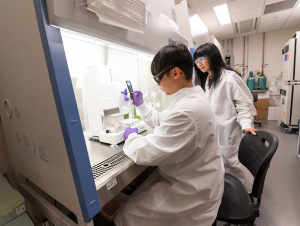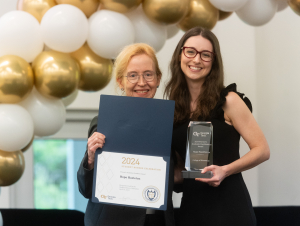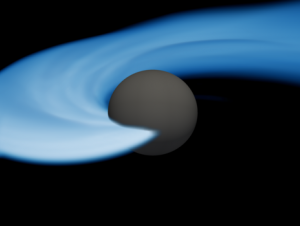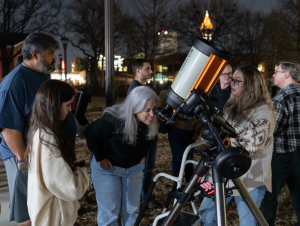Latest News
Their awards total more than $9.5 million in funding, the most Georgia Tech has ever had in the program.
Students from all six College of Sciences schools were recognized for excellence at this year's celebration.
Shortly after the start of the fourth LIGO-Virgo-KAGRA (LVK) observing run, the LIGO Livingston detector observed a remarkable gravitational-wave signal from the collision of what is most likely a neutron star with an unknown compact object — one that's 2.5 to 4.5 times the mass of the Sun.
This week, 50 students from Georgia Tech’s Astronomy Club will travel to Missouri to view the solar eclipse on April 8. Georgia isn’t in the path of totality — which occurs when the moon fully covers the sun — but Missouri is, and club members want to be there to experience the rare celestial event. While viewing the eclipse is the organization’s biggest adventure of the year, it is just one of many events the club hosts every month. The group is a place for hobbyist astronomers and physics students to connect over their love of the solar system and the mysteries within it.
Events
Gravitational-Wave Open Data Workshop Study Hub
(The last day to sign up is April 15, 2024.) This study hub is geared towards local participants (at all levels) who would like to interact with public gravitational-wave data in some capacity, for educational or research purposes.
School of Physics – Physics & Startup Seminar - Professor Christopher Monroe (Duke University and formerly IonQ, Inc)
Quantum Computing Meets Wall Street
GT Observatory Public Night: April 2024
A monthly occurrence of the GT Observatory's Public Night open to all who are interested in viewing celestial objects through our many telescopes here on campus.
School of Physics CM/AMO/Quantum Seminar - Professor Nick Hutzler
Fundamental Physics and Quantum Science with Polyatomic Molecules
Fundamental Physics and Quantum Science with Polyatomic Molecules
Polyatomic molecules uniquely enable the simultaneous combination of multiple features advantageous for precision measurement and quantum science.
Many-body physics and technology with Rydberg atoms
We will discuss several research directions within the realm of many-body physics and quantum technology with Rydberg atoms.
School of Physics CM/AMO/Quantum Seminar - Dr. Alexey Gorshkov
Many-body physics and technology with Rydberg atoms
Experts in the News
In an opinion published in the May 2024 edition of APSNews, School of Physics Professor Andrew Zangwill reflects on the debate on the boundaries of physics and its impact on the discipline. Zangwill states “for more than a century, physicists have been drawing and redrawing the borders around the field, embracing and rejecting subfields along the way.”
American Physical Society News 2024-04-12T00:00:00-04:00The stars aligned to give a Georgia Tech undergraduate student and an alum the moment of a lifetime during the recent solar eclipse. Corinne Hill is currently majoring in physics with a concentration in astrophysics. Nathaniel Greve graduated in 2023 with a degree in computer science. The couple met in 2021 when they both played alto saxes in the Georgia Tech marching band. After being unable to experience totality in 2017, Greve said the pair made plans to go to Wapakoneta, Ohio, for 2024′s eclipse. Hill’s friends in the Astronomy Club went to the Ozarks to experience the eclipse, but Hill agreed to go to Ohio instead.
Atlanta News First 2024-04-11T00:00:00-04:00Crowds in Georgia and people across the U.S. are gearing up to watch the 2024 Great North American Eclipse. The eclipse’s path of totality stretches across 13 states in the U.S. Georgia is not included in the path of totality, but Atlanta is expected to experience the effects of a partial eclipse. Show host Rose Scott speaks with Georgia-based astronomy expert Jim Sowell, a principal academic professional with the School of Physics and an astronomy expert who serves as the director of the Georgia Tech Observatory.
WABE Closer Look with Rose Scott 2024-04-08T00:00:00-04:00It’s been 10 years since the Air Force Research Laboratory, or AFRL, successfully launched the astronomy outreach program called Aloha Explorations at the Air Force Maui Optical and Supercomputing site, or AMOS, in Maui, Hawaii. This STEM outreach project uses an 11-inch Celestron telescope, also known as the Aloha Telescope, to provide students in grades K-12 the ability to view live images from their classrooms and remotely control the telescope via an internet connection. The idea for this project originated from Dr. James Sowell, an astronomer and observatory director at the School of Physics. (This story also appeared at Los Alamos Daily Post and Defense Visual Information Distribution Service.)
Air Force Research Laboratory 2024-04-04T00:00:00-04:00Georgia Tech students associated with the Astronomy Club are traveling to Missouri in order to be in the path of totality for the April 8 solar eclipse. The path of totality is the prime spot for viewing the moon travel between the Earth and the Sun. For the eclipse viewing trip, the Club plans to bring along astrophotography gear, an 8-inch Celestron telescope with a solar filter, and other equipment for members to use. (The Atlanta Journal-Constitution also covered this story.)
11 Alive 2024-04-01T00:00:00-04:00Odd things can happen when a wave meets a boundary. In the ocean, tsunami waves that are hardly noticeable in deep water can become quite large at the continental shelf and shore, as the waves slow and their mass moves upward. In a recent study led by School of Physics Dunn Family Professor Daniel Goldman and published in the journal Physical Review Letters, scientists have shown that a floating, symmetric oscillating robot will experience forces when it comes close to a boundary. These forces can be used for self-propulsion without the need for more typical mechanisms such as a propeller.
Tech Xplore 2024-03-09T00:00:00-05:00





